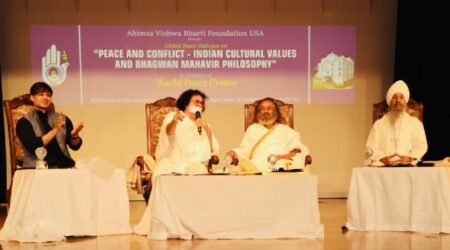By Palakh Jain and Payal Seth
(मंगलाचरण)
जो राग-द्वेष विकार वर्जित लीन आत्म ध्यान में |
जिनके विराट विशाल निर्मल अचल केवलज्ञान में ||
युगपद विशद सक्लार्थ झलके ध्वनित हों व्याख्यान में |
वे वर्धमान महान जिन विचारें हुमारे ध्यान में ||
(Benediction)
Who is bereft of attachments and aversion and is deeply engrossed in the Self;
In whose Omniscience which is great and all pervading,
All the Substances are reflected at one and the same time and described in his holy sermon;
Let that great Vardhman Jin be constantly present in the state of my meditation
What is non-violence as taught by Lord Mahavir?
If one wants to live in a society that shuns violence, and adopts non-violence, then we ourselves have to accept it as a way of life. For that, we have to understand that the definition of non-violence as taught by Lord Mahavir extends beyond the non-killing of others.
अपरादूभर्व: खलू रगदीना भवत्यहिन्सेति |
तेशामेवोतपत्तीहिन्सेति जिनागमस्य संक्षेप: ||
Origination of attachment and aversion in our souls is violence and their non-origination is non-violence- that is the essence of Jain philosophy
Through this definition, Lord Mahavira focussed especially on the root cause of violence i.e. violence at the level of thoughts as opposed to just the physical violence that we usually refer to. As per his teachings, violence originates first in the thoughts. If the violence of four kashays – passions of anger, price, greed, and deceit, is not controlled by the mind, then it translates into violent speech. If such speech is not enough, then it expresses through the body. The sequence of origination of violence is first through the thought. Hence, if violence does not arise at the thought level, then it does not express through language or physique.
Having understood the definition of violence, we now begin to further our understanding of the roots of this violence.
Understanding the root of violence
The origination of attachment and aversion and the subsequent lightening up of four passions – anger, pride, greed, and deceit is the root cause of violence. For instance, analysing the Russia-Ukraine war, one realizes that the war is taking place because of one’s nation’s desire to gain power and authority over the other. This attachment to power is the root cause of this war.
Bringing this same analogy to the individual level, we realize that it is the same attachment that is the root cause of all violence in even enjoying the pleasures of the five senses in this world. For example, one eats palatable non-vegetarian dishes simply due to the attachment and the need to fulfil the desire for acquiring a relishing sense of taste. While doing this, one is committing violence by killing a living being. Or consider that someone is using leather prepared by skinning an animal simply due to their attachment to the way it looks once they wear it. Moving further, all un-virtuous acts like greed-induced stealing, telling lies, etc happen due to our attachment to accumulating more wealth.
Hence, attachment as per Lord Mahavira includes all perverted feelings.
Having understood the meaning and the cause of violence, we now begin to answer the following question.
How does one check violence at the level of thoughts?
To check the violence at the level of thoughts, one must find antidotes to the four passions. Just as the fire is doused by water, anger can be overcome by practicing forgiveness; pride can be arrested by practicing humility; deceit can be countered by nurturing straightforwardness and greed can be restrained by developing contentment. For achieving this, one should thrive to be aware of the types of thoughts generated all the time.
Forgiveness
Jainism places the highest value on forgiveness. One of the most auspicious Jain festival, Paryuṣaṇā or Duslakshana, starts with the first virtue of Soul i.e. Uttam Kshama (Supreme Forgiveness) and ends with Kshamavaani Divas i.e. the day of Forgiveness. Forgiveness is cultivated within to bring inner peace to oneself by freeing oneself from the emotional burden caused by the actions of the wrongdoer (either through ignorance or their own distress). Mahatma Gandhi once said “The weak can never forgive. Forgiveness is the attribute of the strong.” Jains usually utter a phrase during Paryuṣaṇā (as well as throughout the year): Micchāmi Dukkaḍam. That is, “I pray that all the grief that I have caused (to you) goes in vain, and I ask for an unconditional absolution of my unpleasant deeds.” Such is the beautiful emphasis on forgiveness among Jains.
Humility
Humility is a coveted virtue as it shatters our overblown sense of entitlement that disconnects us from our true non-violent nature of the Soul. The absence of humility leads us to forget the contribution of many people who have raised us and made us who we are. Hence, developing humility reduces narcissism and increases empathy. Mother Teresa called humility the “mother of all virtues” and reminded us, “We can do no great things. Only small things with great love”. Jainism recognizes that it is all futile to go on a pilgrimage, observe vows, and take holy pledges when one is lacking in the basic virtue of being compassionate toward other beings. Compassion destroys vanity and egotism; puts a check on all the five senses and the mind. Humility is the easiest way to destroy this vanity.
Straightforwardness
Developing the virtue of honesty or straightforwardness cultivates credibility and trustworthiness. This virtue further brings people into one’s life that are attracted to one’s true and honest self. Hence, it leads to no attachment to maintaining a deluded perception of any aspect of one’s life to oneself as well as others. In the wise words of Lord Mahavira, “By sincerity, a man gains physical, mental and linguistic straightforwardness, and harmonious tendency; that is, congruence of speech and action.”
Contentment
Jainism propagates the principle of Aparigraha or non-possessiveness. Limiting one’s ownership of belongings, one stops to hoard any unnecessary materials, and this leads to an automatic reduction in unhealthy attachment to one’s possessions. A renowned Jain monk, Muni Shri Praman Sagar Ji quotes that contentment is the biggest wealth.
Applying non-violence to daily life
Through daily strenuous practice, once our minds are trained to overcome the four passions and violence, we will feel the impact of such change in the choices that we will make in our daily lives. We will become more compassionate in choosing the right kind of diet (shunning non-vegetarian diets), shopping only what we support (not buying cosmetics tested on animals or animal-skin-made clothes or furniture) as well as conducting our daily dealings with the highest ethics with a firm resolve to avoid causing suffering to others.
Now, through a thorough understanding, if an individual accepts a non-violent way of life, then he/she would become a truly happy individual; if a family accepts it, then the happiness extends to all the members; if the community accepts it, then the community is happy and if the nation accepts it, then peace and happiness prevail in the entire nation. Therefore, starting the holy mission of understanding and accepting non-violence can begin with just a sincere, true heart.
With this article, on the holy occasion of Mahavir Jayanti, we pray that let all beings not only understand the principle of non-violence as propounded by Mahavir but also accept it to achieve a blissful and peaceful life ahead.

Palakh Jain is an associate professor at Bennett University. Payal Seth is a Ph.D. Scholar at Bennett University.












